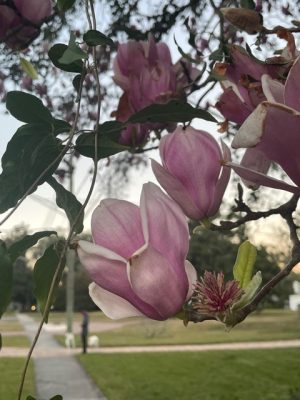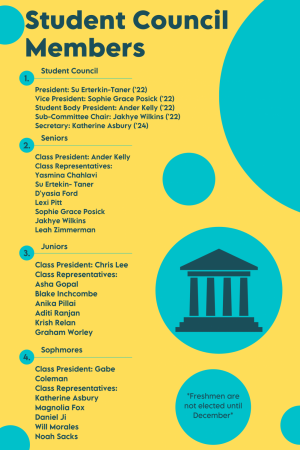Rebellion Denied: Revisiting Tiananmen Square
May 5, 2017
As young as seven years old, Chengmei Rothschild possessed a little rebellious streak.
As her father left for work, Chengmei and her sister tiptoed over to his wallet, snatched a few yen, and sauntered over to the candy store with mischievous smiles.
“He knew I was the mastermind of the operation. He just wanted me to tell the truth, but I was so stubborn and wouldn’t budge. So, he tied both my hands behind my back on the kitchen table’s leg. I sat like that for over two hours,” laughed Rothschild.
“Don’t forget, my Chinese zodiac sign is the horse so I was always bound to run wild.”
Little did Chengmei know that her rebellious streak would continue on a larger scale.
In June of 1989, Chengmei was a student studying Japanese literature at the Beijing Foreign Language University. A student rushing back to her dorm room on an atypically sweltering summer day. A student with one goal in mind: locate a couple hundred washcloths, yes only a couple hundred, to aid a sea of her fellow classmates clustered together at Tiananmen Square.
Chengmei acted as a nurse for the students on hunger and water strikes.
“June in Beijing is unbelievably hot. Fanning away the swarms of buzzing flies was something I’d do to help. I’d mop the sweat rolling down people’s faces. It was difficult but we all wanted our voices to be heard and it was worth it,” explained Rothschild.
Chengmei was also a student who was taken by surprise to find her father, a high-ranking military officer for the Chinese Communist Party, standing tall, firm, and neat, yet with a glint of worry in his eye, dead smack in the middle of her dorm room.
“‘Chengmei, your mother is terminally ill and you need to come home right now,’ were the exact words my father spoke to me that afternoon on June 3rd. I still remember them even after 27 years, and thank God he did,” reminisces Rothschild. “Otherwise, things could have turned out a lot differently.
Worried about her mother, Chengmei arrived home at 3:30 PM, just as all the public transportation in Beijing completely shut down.
Astronomically high tensions engulfed Beijing on June 3, 1989. The Chinese government under Deng Xiaoping recognized that it could tailor its form of government to shape its success. After viewing the Soviet Union’s downfall and feeble economic position, the Chinese government decided that while a capitalistic economy was crucial for success in the international arena, a democratic government was unnecessary.
Young college students in Beijing, however, craved “sweet democracy” as new Western ideas flowed into China through the new economic policies. The students occupied Tiananmen Square to profess their desire for democracy.
“At that time, we were very brave and young and we felt like we were the future of the country and that there was something we can do to make a difference,” said Rothschild.
On June 4, 1989, the Chinese government brutally crushed the Tiananmen Square movement
– over thousands of people killed or injured as soldiers fired into the crowd.
On June 4, 1989, Chengmei was no longer in Tiananmen Square. She and her family were safely huddled around their television watching the shocking events unfold, all thanks to her father claiming her mother was gravely ill the previous day.
For Chengmei, the scene evoked previous memories of demonstrations she participated in during April and May.
“We all locked arms, even with strangers, and we were all connected so that if the soldiers tried to break us they couldn’t. But they were much stronger and they knocked us down easily, including me one time,” recalled Rothschild.
Chengmei’s devastation stemmed from the Chinese culture’s emphasis on the mutual respect that is supposed to exist between the people and the People’s Liberation Army.
“Ever since I was in kindergarten, teachers taught us the phrase, ‘yu ci bu kai shui,’ meaning the ‘fish cannot separate from water.’ The fish symbolic of the army and the water symbolic of the people. It meant we were so tight that we could not live without one another. After this, I felt betrayed. My belief was shattered and everything I thought I knew was crumbling. Plus, my father was in the army. I grew up in the military base, so it hit close to home,” said Rothschild.
As shocking as the events on T.V. were, Chengmei claims that the most prominent feelings felt during that time were relief, appreciation, and love towards her father.
As a child, Chengmei was “extremely close” with her father. He opened up the world of writing and literature to a young Chengmei, and since then they were inseparable.
“My father wanted to be writer when he was younger but eventually became a part of the party. So, he taught me. I learned to read and write before I went to elementary school by him assigning me essay topics every night to read to the family at dinnertime. I loved being in the spotlight and loved how proud of me he was. He just understood me; he knew me inside and out,” said Rothschild.
Chengmei’s father did indeed know his daughter well, for he understood that lying was necessary to urge his passionate and rebellious daughter to come home before the violence ensued.
“I had no idea that he lied to me until I saw my mom cooking in the kitchen. He didn’t say a word. When you’re young, you’re not afraid of anything, including death. He knew that I was like that. Although his loyalty was to the party, no parent wants to see their child die. I’m nothing but grateful,” said Rothschild.
Rothschild continued, “And so, on that same day, I went to his study. We were both silent for a while. I approached him and all I said was, ‘Thanks, Ba.’”






